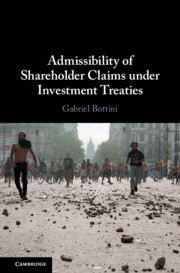
- Publisher:
- Cambridge University Press
- Online publication date:
- September 2020
- Print publication year:
- 2020
- Online ISBN:
- 9781108658522
- Subjects:
- Public International Law, Law, International Trade Law


This book addresses a growing problem in international law: overlapping claims before national and international jurisdictions. Its contribution is, first, to revisit two pillars of investment arbitration, i.e., shareholders' standing to claim for harm to the company's assets and the contract/treaty claims distinction. These two ideas advance interrelated (and questionable) notions of independence: firstly, independence of shareholder treaty rights in respect of the local company's national law rights and, secondly, independence of treaty claims in respect of national law claims. By uncritically endorsing shareholder standing in indirect claims and the distinctiveness of treaty claims, investment tribunals have overlooked substantive overlaps between contract and treaty claims. The book also proposes specific admissibility criteria. As opposed to strictly jurisdictional approaches to claim overlap, the admissibility approach allows consideration of a broader range of legal reasons, such as risks of multiple recovery and prejudice to third parties.
‘A great contribution to the progressive development of international investment law to be born in mind by all participants in international arbitration proceedings. This learned study advices the reader on the need of developing within international investment law substantive inadmissibility or other substantive means to avoid double recovery and other undue overlaps resulting from an independent treatment by Arbitral Tribunals of shareholders’ treaty rights and of treaty-claims in respect to company’s rights and contract- claims, respectively.'
Santiago Torres Bernárdez - Former Registrar and Judge ad hoc of the ICJ. ICSID and PCA Arbitrator.
'This is a masterly study of shareholder claims in investment arbitration. Comprehensive, thoroughly-researched and well-written, the book challenges the independence of indirect shareholder claims under investment treaties from company rights under national or contractual law. Focusing on issues of both practical and scholarly significance, this rich contribution will be invaluable to both practitioners and academics. It deserves to be widely read!’
Catharine Titi - French National Centre for Scientific Research (CNRS)-CERSA, University Panthéon-Assas Paris II
‘Gabriel Bottini relies on ideas contained in the jurisprudence of old mixed claims commissions and of the International Court of Justice to build on the concept of admissibility and deal with some of the most pressing problems presented by shareholder claims under investment treaties.’
Professor Raúl Vinuesa - University of Buenos Aires
‘Balanced, rigorous and timely, a most valuable addition to our understanding of this complex set off issues, of great value for scholars and practitioners alike’.
Professor Philippe Sands QC - UCL and Matrix Chambers
‘Investment tribunals deciding shareholder claims tend to regard Barcelona Traction as a quaint relic of the law on diplomatic protection. Gabriel Bottini shows how Barcelona Traction never went away. His nuanced admissibility criteria offer a fresh approach to shareholder standing to prevent double recovery. Through the prism of shareholder claims, he casts new light on linkages between contract and treaty’.
Professor Michael Waibel - University of Vienna
 Loading metrics...
Loading metrics...
* Views captured on Cambridge Core between #date#. This data will be updated every 24 hours.
Usage data cannot currently be displayed.